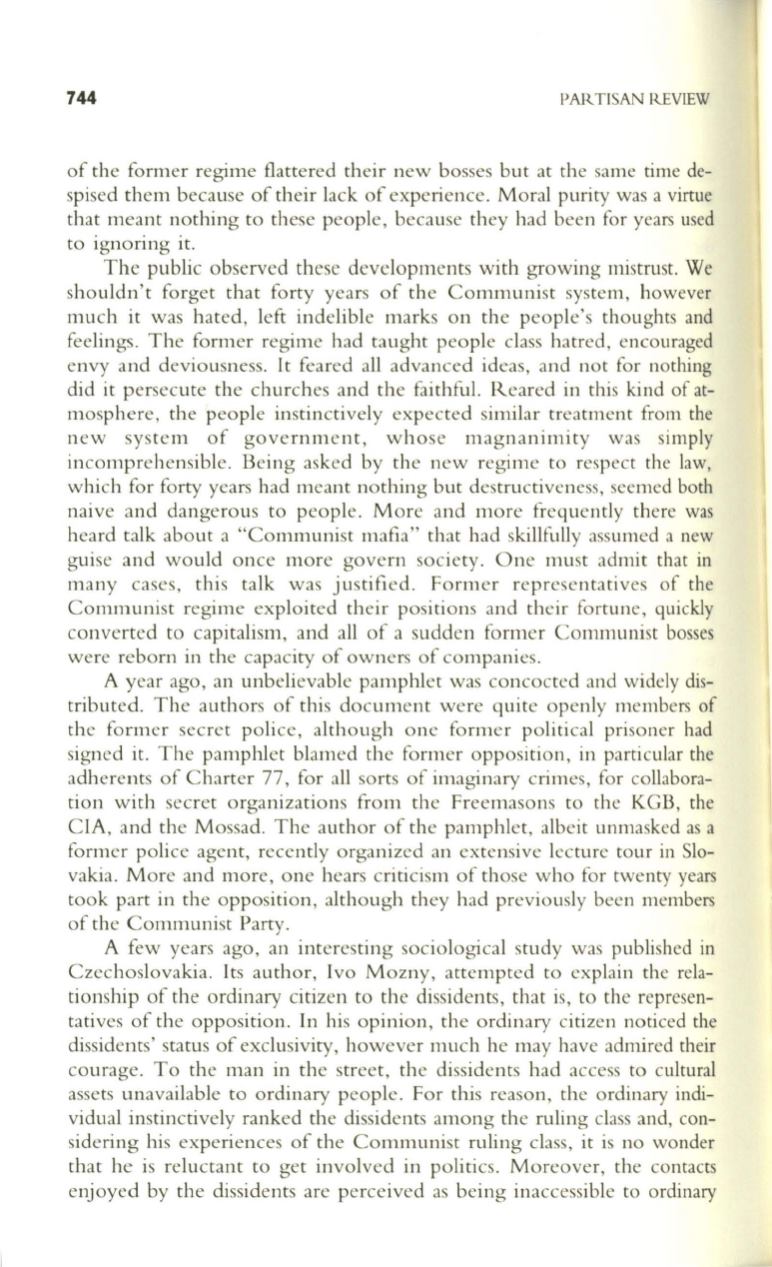
744
PAR.TISAN REVIEW
of the former regime flattered their new bosses but at the same time de–
spised them because of their lack of experience. Moral purity was a virtue
that meant nothing to these people, because they had been for years used
to ignoring it.
The public observed these developments with growing mistrust. We
shouldn't forget that forty years of the Communist system, however
much it was hated, left indelible marks on the people's thoughts and
feelings. The former regime had taught people class hatred, encouraged
envy and deviousness. It feared all advanced ideas, and not for nothing
did it persecute the churches and the faithful. Reared in this kind of at–
mosphere, the people instinctively expected similar treatment fr0111 the
new system of government, whose magnanimity was simply
incomprehensible. Being asked by the new regime to respect the law,
which for forty years had meant nothing but destructiveness, seemed both
naive and dangerous to people. More and more frequently there was
heard talk about a "Communist mafia" that had skillfully assumed a new
guise and would once more govern society. One must admit that in
many cases, this talk was justified. Former representatives of the
Communist regime exploited their positions and their fortune, quickly
converted
to
capitalism, and all of a sudden former Communist bosses
were reborn in the capacity of owners of companies.
A year ago, an unbelievable pamphlet was concocted and widely dis–
tributed. The authors of this document were quite openly members of
the former secret police, although one former political prisoner had
signed it. The pamphlet blamed the former opposition, in particular the
adherents of Charter 77, for all sorts of imaginary crimes, for collabora–
tion with secret organizations from the Freemasons to the KGB, the
CIA, and the Mossad. The author of the pamphlet, albeit unmasked as a
former police agent, recently organized an extensive lecture tour in Slo–
vakia. More and more, one hears criticism of those who for twenty years
took part in the opposition, although they had previously been members
of the Communist Party.
A few years ago, an interesting sociological study was published in
Czechoslovakia. Its author, Ivo Mozny, attempted
to
explain the rela–
tionship of the ordinary citizen to the dissidents, that is,
to
the represen–
tatives of the opposition. In his opinion, the ordinary citizen noticed the
dissidents' status of exclusivity, however much he may have admjred their
courage. To the man in the street, the dissidents had access
to
cultural
assets unavailable
to
ordinary people. For this reason, the ordinary inru–
vidual instinctively ranked the dissidents among the ruling class and, con–
sidering his experiences of the Communist ruling class, it is no wonder
that he is reluctant to get involved in politics. Moreover, the contacts
enjoyed by the dissidents are perceived as being inaccessible to ordinary


